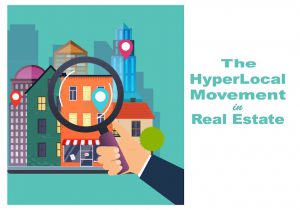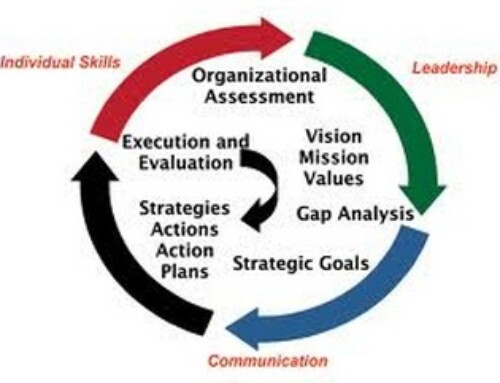 Social media, mobile technology and marketing automation: those are the three ingredients that are changing real estate in a profound and everlasting way. And, unlike many skeptics, I believe it’s for the better. My proof is the emergence of a “HyperLocal Movement” in real estate that the confluence of these three has fueled.
Social media, mobile technology and marketing automation: those are the three ingredients that are changing real estate in a profound and everlasting way. And, unlike many skeptics, I believe it’s for the better. My proof is the emergence of a “HyperLocal Movement” in real estate that the confluence of these three has fueled.
Now there is really nothing new about the “idea” of HyperLocal in real estate. No other industry has been more focused on being local than ours. Many agents have legitimately been practicing hyperlocalism for years, if not decades. What is new is what’s happening NOW with hyperlocalism, or more importantly, what’s NOT happening across America.
That’s the conclusion of a brand new White Paper from the WAV Group — HyperLocal Movement in Real Estate – that we just issued. It was sponsored by a very hot Colorado real estate tech startup zavvie, a broker technology provider that specializes in HyperLocal marketing. It’s 100% free. The beautiful 40+page report is filled with graphics, statistics, and information from expert sources inside and outside of real estate can be downloaded here.
Survey says…
It all started when the WAV Group conducted real estate’s first HyperLocal Survey, in partnership with zavvie. The HyperLocal Survey of 340 leading brokers, agents, team leaders, and industry executives had a shocking finding: agents and brokers said one thing, and did something completely different.
The survey showed this great disconnect between agents and teams, saying they were neighborhood specialists, or hyperlocal, but they reported that they actually were doing very little neighborhood focused marketing activities.
For example, more than 60% of agents and 65% of teams said they “specialize” in a large regional or metro area. But that’s not specializing. You can’t specialize in a city or town, hyperlocal experts like Stefan Peterson, the COO of zavvie will tell you. “It’s just too big of an area to be the ‘go-to expert’ who knows every single home in that market,” he said.
Stefan is so right. His business partner, Lane Honung, the other cofounder of zavvie, nails the behavior when he explains that agents and teams are just so afraid of losing out on business,
“they cast a wider net.” Instead, hyperlocalism tells you to do the opposite: specialize and focus solely on a neighborhood or area of about 3,000 homes or less. Lane knows his stuff: he’s in the RE/MAX Hall of Fame and ran the #1 Team in Colorado. He’s been there. He understands agent behavior because he has been one.
Going deeper
So all of the data in the survey kept showing this huge disconnect, a gap between both what agents, teams and brokers knew consumers wanted – local expertise – and how the vast majority of agents were marketing themselves. HyperLocal marketing tools that let them share their local expertise locally – things such as “Nextdoor,” a “Blog” or a “Neighborhood Website” — none of these were being used widely by anyone: only 7% had a Blog, only 15% had a Neighborhood Website, and fewer than one in five (17%) were on Nextdoor!
But how did the agents and teams view themselves? More than a third — 38% — said they were “Extremely Knowledgeable” about local happenings, events, and changes that affect the real estate market. And in the survey, “Extremely Knowledgeable” was defined as “No one is more ‘in the know’ than I am,” and the other 42% described themselves as “Very Knowledgeable” locally.
That’s terrific, but if you aren’t doing anything locally to tell anyone what great local knowledge you have, how does anyone know it?
The World’s First HyperLocal White Paper for Real Estate
That’s why we had to take the next step to look further into the state of Hyperlocalism in real estate among those who were using it correctly.
What we found in the additional research that Victor Lund, founder of the WAV Group, and I collected in creating this White Paper was a highly successful “HyperLocal Movement” emerging in real estate. It’s presenting real estate agents and brokerages with a massive opportunity to build robust businesses that can thrive regardless of “digital disrupters” or even market conditions.
The most important takeaway: Becoming a neighborhood expert is the best way agents can differentiate themselves in today’s marketplace.
We present HyperLocal research findings from dozens of studies conducted by top marketing, real estate and research firms in the U.S. and abroad. There are detailed graphs, charts, and analysis, and hundreds of data points. This White Paper is the most comprehensive look at Hyperlocalism in real estate today.
Case Study: A Hyperlocal Brokerage Model
As part of the White Paper, Victor did a Case Study of a brokerage based in Boulder, Colorado: 8z Real Estate. 8z was built upon a philosophy of HyperLocal marketing. In eight years and with just 150 agents, it did $1 billion in transactions last year and has become one of the Top 10 brokerages in Colorado.
Victor gives you a look under the hood of the firm that spawned the technology that became zavvie. You can see not only how a HyperLocal approach works, but that it works incredibly well and the unique benefits it brings.
Is Hyperlocal a strategy to combat digital disruptors?
- Mary Meeker said, “HyperLocal targeting is more effective than any other kinds of advertising in driving engagement.”
- Josh Team, Chief Innovation Officer at Keller Williams talked about “Surviving Real Estate Disruption” and said, “Technology can’t compete with the agent as a local expert,” Team said. “This is something that technology has a really hard time doing. Be the local expert, and you can defend yourself. And brokers like us should be investing back into the agent to make it easier for them to be that expert.”
- Real estate author Bruce Gardner is even more emphatic, saying, “No technology can replace the HyperLocal expertise or the network and relationships of a local real estate expert.”
The White Paper features additional observations about Hyperlocalism from many other top real estate and marketing professionals including, Noelle Bortfeld, CMO of Windermere Real Estate; Eric Stegemann, CEO, TRIBUS; expert blogger and real estate marketing consultant Heather Elias; Neil Cohen, a nationally renowned brand marketing expert; Abbie Tse Higashi, General Counsel and Manager at McGuire Real Estate in the San Francisco area; Jimmy Mackin of Curaytor; and Daniel James Lesniak, real estate agent and author of The HyperLocal, HyperFast Real Estate Agent.
Again, the White Paper HyperLocal Movement in Real Estate is available at no cost – completely free with registration here (http://www.zavvie.com/hyperlocalwp).




